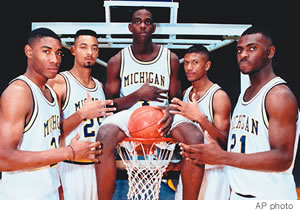An Incomplete ‘Fab Five’ Film
At its best, ESPN’s documentary on Michigan’s Fab Five reminds viewers of the most talented starting unit in NCAA history and the unquestioned excitement it brought to college basketball.At its worst, it fails to connect the dots in a series of events that turned an underdog national champion into a rogue program where boosters felt little need to cover up their actions.
At its most inflammatory, the film’s executive producer and his teammates, recalling the ignorance of youth, disparage a program and its athletes.
Lacking the cultural perspective to accurately assess the issue, it would be ignorant of me to comment on the appropriateness of Jalen Rose’s “Uncle Tom” comment. What is clear is that the term, even if it expresses the opinion made by a teenager some 20 years ago, still carries considerable weight, and its ability to hurt and offend remains effective. We were reminded of this fact in the wonderfully articulate rebuttal by Grant Hill, who was the main subject of the attack. Rose’s comments may have been ignorant, but taken in context it is easy to understand why he felt the way he did.
Regardless of race, looking negatively at those who have more than we do is a common American and perhaps international reaction. It’s easy to hide behind the wall of our own ignorance and find solace among those more like ourselves whose distrust of outsiders further feeds resentment.
“I was jealous of Grant Hill,” said Rose in the film. “He came from a great black family.
Congratulations. Your mom went to college and was roommates with Hillary Clinton. Your dad played in the NFL and was a very well-spoken and successful man. I was upset and bitter that my mom had to bust her hump for 20-plus years. I was bitter that I had a professional athlete that was my father that I didn’t know. I resented that more so than I resented him. I looked at it as they are who the world accepts and we are who the world hates.”
Rose said basketball – and life – was very different in west Detroit, where guns were common at games as were spectators threatening violence should the favored team lose. Video evidence of the rough nature of Detroit public school basketball became evident when a young Rose was nearly decapitated while trying to drive to the basket. His opponent never looked back, and no one seemed particularly surprised even as Rose was placed on a stretcher and taken off the court.
So, in that context, Rose’s beliefs were understandable even if his comments were inappropriate.
With all the discussion over those few short moments of the film, another key part of the story has been ignored: the disintegration of institutional control and the string of curious decisions and opinions that provided a road map to trouble.
* Coach Steve Fisher was in the hot seat after getting knocked out in the second round of the NCAA tournament one year after winning the title in 1989. The following year, the Wolverines bowed out in the first round of the NIT.
Facing criticism about whether he could recruit players good enough to win another championship, he lands four of the top 11 high school players in the country. The fifth recruit, Ray Jackson, was ranked the 46th best player in the country.
* Shortly after Rose signed his letter of intent, his high school coach, Perry Watson, was hired by Fisher to be an assistant coach.
* Days after losing to Duke in the NCAA title game, the team flew to Europe to play against professional teams. The trip left a mark. “It made us feel like pros,” says Rose in the film. “And it made us start paying attention to the business aspects of the game. We’re in Europe playing pro teams, the stands are full. Somebody is getting paid this summer, and it ain’t us.”
* In 1992, the group of five sophomores staged a protest. They began their warmups at a game wearing plain blue T-shirts. “They didn’t say Michigan. They didn’t say Nike. They didn’t say anything. That was our silent protest,” said Rose.
We learn the guys felt exploited after going into a Nike outlet in Chicago and seeing Fab Five shoes, hats and shirts in the store.
“That’s when you start realizing that having your own shoes doesn’t necessarily put money in your pocket,” said Rose.
Is it too much to assume that after seeing their image sold for millions, and in the wake of their protest, that some began to look elsewhere for compensation?
The film tells us merchandising sales rose from $1.6 million following their 1989 championship to more than $10 million during the two years the five remained a unit. After all, this was a group of players used to special treatment.
Center Juwan Howard said they didn’t enjoy their trip to Europe because, “We were spoiled.” Eric Riley, the starting center before the five arrived, said, “Anyone is going to have resentment if your boss brings in some other people above you and treats them so much better than they treated you.”
The film doesn’t attempt to connect these facts with the program’s eventual fall from grace. An investigation, which involved the U.S. Attorney’s Office, later found that Chris Webber, Maurice Taylor, Robert Traylor and Louis Bullock borrowed a total of $616,000 from booster Ed Martin, whom Rose said was known as “Big Money” Ed.
It’s the most glaring omission from the thought-provoking and entertaining documentary.
You must be logged in to post a comment.





There are no comments
Add yours